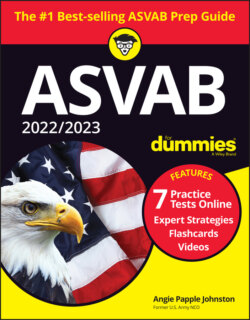Читать книгу 2022 / 2023 ASVAB For Dummies - Angie Papple Johnston - Страница 50
Word Knowledge
ОглавлениеIN THIS CHAPTER
Being well-spoken in the military
Seeing some example questions
Keeping a word list
Knowing the difference between synonyms and antonyms
Improving your overall vocabulary
To make it to basic combat training, you need a pretty decent vocabulary that helps you score well on the Word Knowledge subtest of the ASVAB. Not only do you have to know how to spell to some degree (so you can differentiate among words), but you also need to know what the words on the test mean. The military wants to know how big your vocabulary is so it can determine whether you’ll be able to communicate with other troops, understand written and spoken instructions, report to higher-ups, and lead junior servicemembers.
So, what if you don’t know the difference between a carbine and a carbon? Never fear — I’m here to give you a helping hand (or bestow upon you inestimable guidance and encouragement, if you prefer). With the help of this chapter and a little work on your part, you can whip your word-knowledge skills right into shape. And then at the end of the chapter, you can check out the practice questions to test those skills.
When you take the Word Knowledge subtest on the computerized version of the ASVAB, you have 9 minutes to answer only 15 questions, which means you have 36 seconds to answer each question. (If your Word Knowledge subtest includes tryout questions, which I explain in Chapter 1, you have 18 minutes to answer 30 questions.) On the paper version, the schedule’s a little tighter. You have 11 minutes to answer 35 questions (or less than 20 seconds for each question). Either way, it’s plenty of time, as long as you stay focused and don’t waste time daydreaming about your future in the military (sorry, I mean becoming lost in reverie as you consider your impending enlistment).
These days, most candidates take the computerized version of the ASVAB, which is designed to ask you questions that gauge your ability quickly. You start with a question of medium difficulty. If you answer correctly, you see a harder question next; if you answer incorrectly, you see an easier question next. Some people find that the ASVAB is easier — or harder — than they expect, but that’s only because the test adapts itself to the test-taker’s ability.
